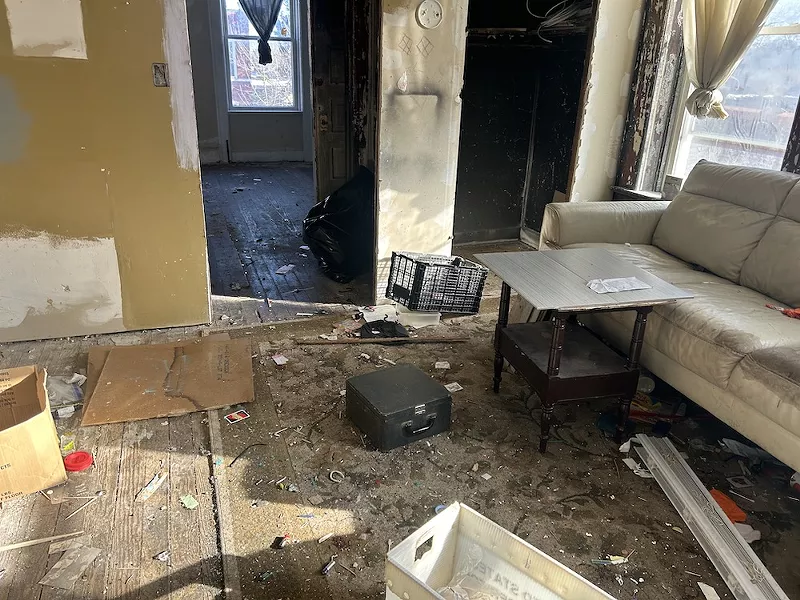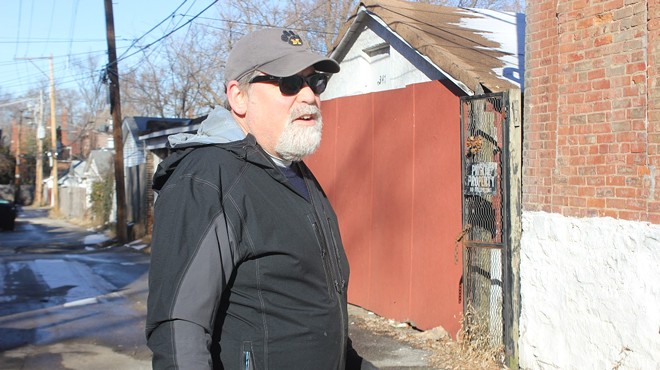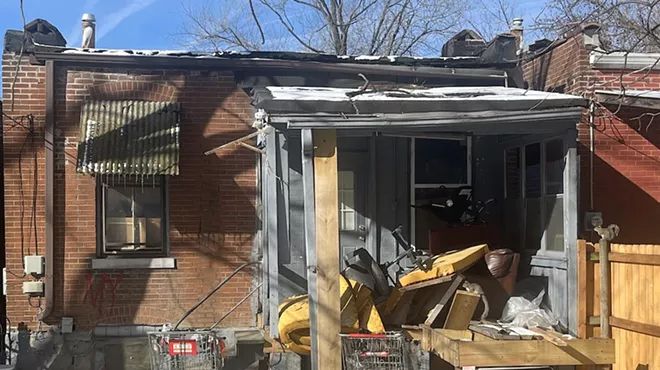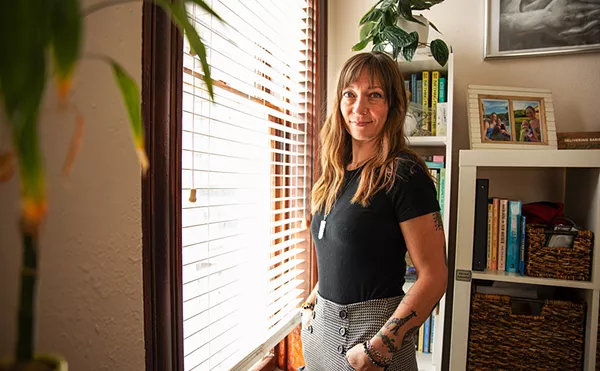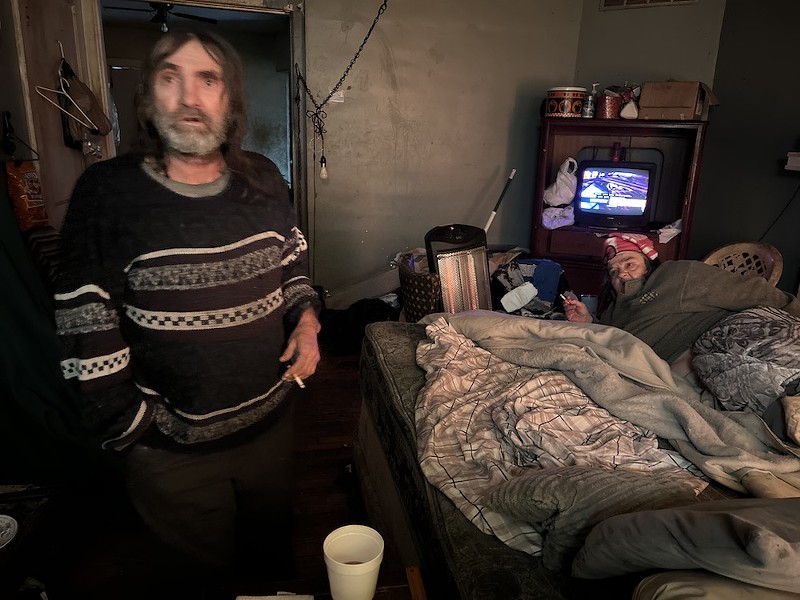
Lisa Cranford, 53, has no clue where she’ll be living a day from now.
Cranford’s landlord has ordered her out of the cramped and ramshackle apartment she lives in on the 4700 block of Michigan Avenue. But time is running out, and Cranford hasn’t even started looking for a new place to live.
“She gave me until Tuesday,” Cranford said Friday of her landlord, real estate investor Dara Daugherty. “But I don’t know what I can do because I haven’t paid her rent because the police told me not to. With my husband being sick, and me working, I’ve had no time to do anything.”
Cranford and her husband moved into the apartment in Tower Grove East back in August. Last week, Cranford’s husband died from lung and bone cancer — and Cranford also learned from police the apartment building had been condemned years ago, and that Daugherty had been renting it to the couple illegally.
“I didn’t know this place was condemned,” Cranford told an RFT reporter on Friday. “I would never have moved in.”
In a 57-page lawsuit filed last week, the city of St. Louis accused Daugherty and her business partners of running a sprawling real estate scam involving 39 condemned properties in nine neighborhoods. The city accused the group of turning condemned buildings into illegal rooming houses, preying on vulnerable people by taking their cash in exchange for near-uninhabitable spaces.
The lawsuit was filed against Daugherty, Keith Mack, four other people and dozens of LLCs they control.
Daugherty allegedly sought out new tenants in homeless shelters and food pantries, and preyed on the "vulnerable and indigent," including those suffering mental illness and drug addiction. Daugherty allegedly bragged that she pulled in $40,000 a month from the scheme, according to the lawsuit.
The lawsuit states that for one property on Virginia Avenue, which Daugherty rented out between 2018 to 2023, the city Building Division issued seven notices of condemnation as well as notices of 159 ordinance violations.Yet Daugherty continued to rent it out room by room, according to the lawsuit.
It remains unclear how many of Daugherty’s tenants have already left her properties, and how many more are in danger of being booted out in the weeks ahead. A visit to five of the condemned buildings named in the lawsuit confirmed that the city’s lawsuit exposed a dangerous and exploitative situation. For the people who’ve relied on the illegal rooming houses for shelter, however, it hasn’t solved it.
That includes Cranford, on Michigan Avenue. She said she was the only person living there.
At three of the five properties, no one answered the door, though a peek through the windows revealed obvious signs of human habitation, including the presence of dogs, small children’s toys and shoes.
In a three-story walkup on the 4700 block of South Grand Boulevard, there were at least three occupied apartments, each with running water and electricity, even though the buildings are officially condemned.
On the top floor, married couple Jerry Randall, 62, and Darlene Hughes, 64, said they had been living in the building for 11 years and had not encountered major problems.
“Nah, they ain’t told us to leave,” said Randall, who’s been disabled nearly his entire life because of a childhood accident and receives a monthly $943 Social Security Income check. “A good thing. I ain’t got nowhere to go.”
Money is tight for Randall and Hughes, who, because of poor vision and back problems, is also classified as disabled and receives $943 each month.
On a bitterly cold afternoon, the apartment was warmed by a large electric space heater perched haphazardly on a table and a pile of clothes. The regular heat has been shut off because they couldn’t afford it, he said.
“We don’t got money to pay a gas bill,” Randall said as he took a contemplative drag off a cigarette. “We barely got money to pay the electric bill.”
Randall and Hughes knew Daugherty through her mother.
“We started renting from her mother,” he said. “Her mother died. She took over, then we started renting from her.”
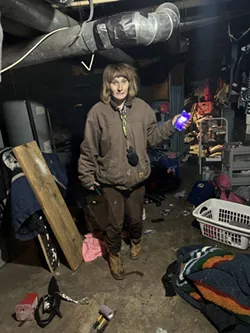
One floor below, Tamara Rosselot, 31, shares an apartment with an ex-boyfriend while she tries to get her life together after living sporadically on the streets.
Unemployed for the past eight years, Rosselot said she gets by because “friends help me out.” Her ex pays Daugherty a monthly rent of $600, plus the extra $50 to cover for Rosselot.
One of her top priorities, Rosselot said, is winning custody of her 3-year-son from her mother, who lives in Arnold.
“We’re trying to get him back,” she said.
Last year, with Daugherty’s help, she applied for financial assistance through the federally funded State Assistance For Housing Relief program, or SAFHR, which provided rent and utility aid to tenants hurt by the COVID-19 epidemic. The money never came through, Rosselot said.
As for life in the building, Rosselot described it as “hell.”
Why?
“Because nothing works,” she answered. “I’m trying to look for a place.”
To illustrate her point, she led an RFT writer to the building’s basement, which was strewn with trash, rusty tools and piles of old clothing, which she explained by way of saying, “Me and my ex got into a fight.”
Rosselot pointed to the aging gas-fired furnace, whose pipes were wrapped in thick layers of gray and black duct tape.
“There’s a gas leak,” she said. “Ameren and Spire have already been out here.”
Does she think it’s dangerous to live here?
“Yeah,” she replied.
The same spirit of show-and-tell applied to Cranford.
Although she declined to show an RFT reporter her apartment, Cranford led him to the back of the apartment house, then through a battered metal door with a broken handle.
Cranford gingerly walked up a steep, litter-strewn stairwell to an abandoned open-floor apartment, whose last tenants had thoroughly trashed it before leaving.
As she walked across the room, Cranford recalled how things started off well with Daugherty back in August.
“At first she was real nice,” Cranford said. “She helped me and my husband.”
Cranford never got to sign a lease, though, and looking back, she sees that as a red flag.
“She kept telling me she was going to bring it over,” she said. “This was early on. And I saw it in her hand one day, but she never let me sign it. I kept asking for it and asking for it.”
During their first month, “Everything was fine,” she said. “Then all of a sudden I seen things changing. Her not fixing anything.”
A fearful look crossed Cranford’s face as she contemplated future interactions with Daugherty.
“Why is she not arrested yet?” Cranford said, wincing. “Because she was here yesterday.”
Cranford stared at the bare wooden floor for a long moment, as if pondering her options, none of which at that moment seemed palatable.
“She’s very intimidating,” Cranford said. “She’s mean.”
Subscribe to Riverfront Times newsletters.
Follow us: Apple News | Google News | NewsBreak | Reddit | Instagram | Facebook | Twitter | Or sign up for our RSS Feed

